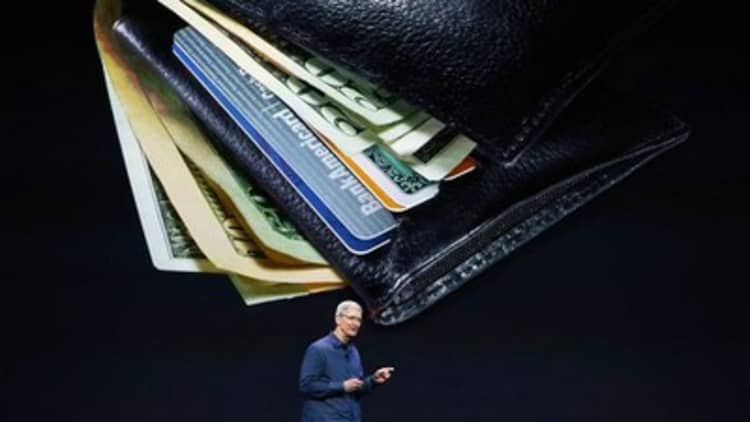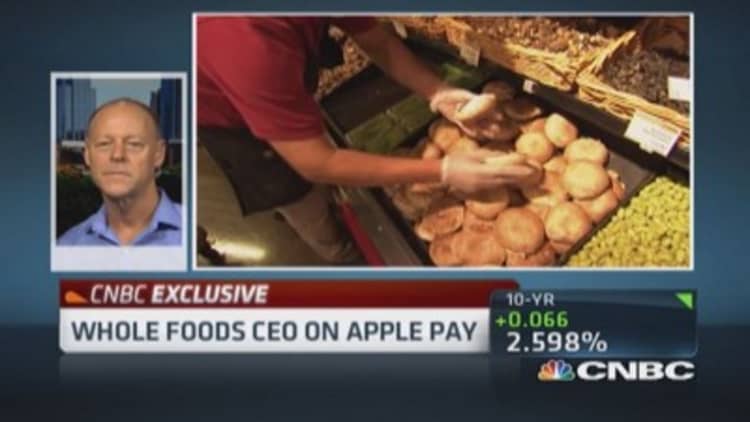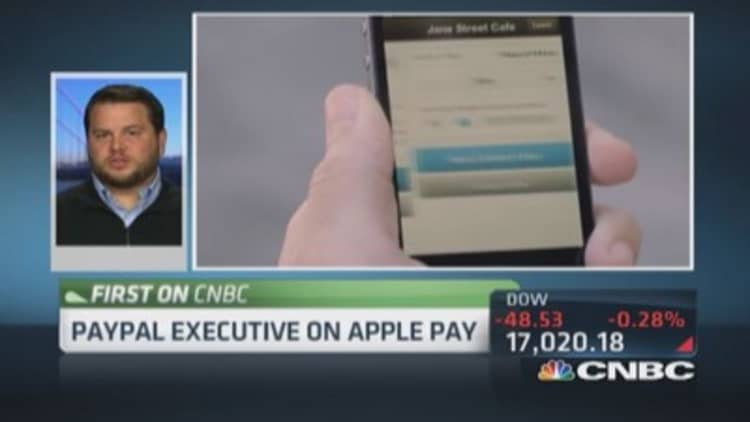When Steve Jobs unveiled the iPod in 2001, he saw an opportunity to reshape an industry. The device sold hundreds of millions and its pairing with iTunes became so successful that it unbundled the album and killed the CD, destroying music industry revenue in the process.
Read MoreApple Pay faces huge challenges: PayPal exec
Fast forward 13 years and Apple is again looking to revolutionize an industry with Jobs' successor Tim Cook revealing this week its entry into the finance sector with Apple Pay. Payments, he said in language reminiscent of Jobs' original comments, is a "huge business", with $12bn worth of daily transactions in the US alone, restricted to using an "antiquated" card swipe system. The banks, technology companies and retailers that have "dreamed of replacing" the wallet with the smartphone have "all failed", he declared.

It was an iPod moment for cash and credit cards. Analysts believe that Apple's popularity and market share might allow it to do what so many others – among them Google – have struggled to achieve.
Apple controls the hardware and software in its iPhone, improving security from the silicon to its fingerprint reader. As the world's most valuable company, it has the clout to cajole banks and retailers to adopt its technology. What Apple must now do is persuade consumers that tapping their mobile to pay is easier than fishing in a handbag for a card.
As the iTunes example shows, Apple's profit is often another industry's loss. Wall Street already views Silicon Valley as a competitor for the best graduates but tech companies could also grab profits from the banks. "[They] all want to eat our lunch," Jamie Dimon, chief executive of JPMorgan Chase, the largest US bank by assets, said this year.
Read MoreWhy ApplePay Will Hurt PayPal
But such is the sway of the tech company that JPMorgan, Visa and the other banks and payments networks sent senior executives to Mr Cook's presentation on Tuesday to pay homage. Bank chief executives fawned about the "exceptional customer experience" and the "exciting move".
They are also paying hard cash for the privilege of being involved: 15 cents of a $100 purchase will go to the iPhone maker, according to two people familiar with the terms of the agreement, which are not public. That is an unprecedented deal, giving Apple a share of the payments' economics that rivals such as Google do not get for their services.
"That makes Apple Pay unique," says Dickson Chu, chief product officer at start-up Ingo Money, who worked at PayPal and, while at Citigroup, on the Google Wallet. "It's somewhat surprising that Apple was able to negotiate something Google couldn't."
The list of early Apple Pay partners is impressive, including the 11 biggest US card issuers, representing 83 per cent of the market, and retailers such as McDonald's and Walgreen which together have 220,000 US stores ready to receive iPhone payments.
While it lacks retailers such as Walmart and Best Buy, which in 2012 teamed up to develop a mobile wallet of their own, Apple's ability to wrangle representatives from three big groups of the payments world – banks, credit card companies and merchants – is no mean feat.
Read MoreIs ApplePay a bitcoin killer?—Commentary
Part of the reason the 50-year-old credit card system remains "antiquated" is because it relies on a complex ecosystem of players that rarely agree on how best to change their industry. However the chief executive of one payment technology company, who asked not to be named, said he was surprised that the banks were so willing to concede to Apple after what happened to the record labels.
Led by its iTunes and App Store chief Eddy Cue, Apple has been negotiating with banks and credit card companies for more than a year. In development, the project was kept under wraps, with the iPhone maker striking fear into its new partners if they stepped out of line.
"There were people working on the solution [at the bank] that didn't even know what they were working on," says Jim Smith, head of virtual channels at Wells Fargo. "It was kept to a real, limited, absolutely need-to-know perspective."

Bruce Dragt, global leader of ecommerce at payments processor First Data, says: "Everybody understood the drill of what they could and couldn't say, who they could and could not talk to."
If the world's biggest banks see Apple as a threat, why did they get into bed with the technology company and agree to give up a slice of revenues?
One of the reasons it was able to corral so many partners was the absence of anything in Apple's plan that would be truly disruptive to their businesses – at least for now. Apple's model "still puts us at the center of payments", says one bank executive.
The "near-field communication" technology that allows a customer to pay in-store by tapping a phone at a terminal is already in place, even though products that use it, such as Google Wallet, have failed to gain mass acceptance. Banks were already planning to adopt the secure "token" that generates and transmits a one-off code to pay for transactions rather than a signature or PIN, and see others following now that Apple has adopted it.
Read MoreHow hackers couldstill get around Apple Pay security
Absent from Apple Pay is the ability for users to send money to each other or Bluetooth technology, which would allow users to pay several meters from a terminal rather than a couple of centimeters.
"There's nothing really technologically new in what they're doing," says Hans Morris, former president of Visa and now managing partner at venture capital firm Nyca Partners. But he says that the way Apple has assembled a group of companies more used to competing than collaborating is "analogous to iTunes."
"Everyone knew that technology could deliver a better consumer experience, but you had record companies, artists and competing delivery systems in disagreement," Mr Morris says. "Once Apple pulled it together in a compelling package with key participants on board, everyone else came around."
Banks are willing to lose a slice of revenues in the hope that Apple Pay will become ubiquitous. That would drive up transaction volumes – and therefore overall revenue – and could reduce losses to fraud through its tighter security.
MasterCard and Visa now cover the cost of card fraud, but from next year will hold retailers responsible if they do not use the "chip and PIN" technology that is widespread in Europe but nearly unheard of in the US. The new retail terminals often allow both PIN and NFC transactions. That could speed uptake of Apple Pay.
Even though the in-store payments were the centre of Apple's presentation, banks are more excited by streamlining online shopping. Giving customers an Apple Pay button to press online, rather than typing in card information – particularly on a small screen – will be a real catalyst to more spending, banks believe.
"This is about ecommerce," says Jud Linville, head of cards at Citigroup. "If there is an app where somebody is shopping, being able to close out that shopping experience by tapping Apple Pay delivers convenience and security."
That would make PayPal a more obvious target for disruption by Apple. By bundling its rival with every new iPhone and Watch, Apple is already stealing some potential growth from PayPal's own attempt to create a wallet app.
Despite the lessons from iTunes, for now the banking and payments industry is confident that Apple is a benign partner. "What Apple really announced was the end of the plastic credit card, but not the end of paying by credit," says Jason Oxman, chief executive of industry group Electronic Transactions Association.

The onerous regulation involved with becoming a bank creates one big moat that Apple is unlikely to try to cross. Data protection, security and anti-money laundering processes are a long way from slick smartphones and cloud storage services. "There's not a lot of people that say, 'I'm really interested to hold a lot of capital and risk-weighted assets'," says a senior executive at a US bank.
But future versions of Apple Pay could threaten the established order more deeply. Just as iTunes moved from music into movies, TV and radio, Apple could creep into more areas of financial services in that grey area between simple payments and full-fledged bank.
"Apple's playing a long game. They could use [consumers'] adoption to run an end-game around the existing payment infrastructure," says Ben Milne, founder of payments processor Dwolla. Their ownership of hardware, software and hundreds of millions of customers' payment details, he says, means "they're the only company in the world that can actually do that . . . Apple is not a company afraid to exercise control."
Banks are giving up some of the profits from payments made through Apple but the 0.15 per cent charge may seem meagre in the face of competing mobile payment systems that are more ambitiously trying to cut out the financial institutions altogether.
Read MoreApple Watchdoesn't matter, Apple Pay does
"It's going to happen with or without you," says Scott Galit, chief executive of Payoneer, which specializes in cross-border payments. "It makes sense to pick the guy who wants to play with you as opposed to the guys who are trying to cut you out."
Just as the iPod killed the CD, Apple hopes to see off plastic and paper payments. While iTunes lightened the music industry's wallet, banks must hope that Apple Pay will fatten theirs, rather than replace them entirely.
—Reporting by Tom Braithwaite, Camilla Hall and Tracy Alloway in New York, and Tim Bradshaw, Sarah Mishkin and Richard Waters in San Francisco.

